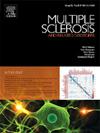与鞘氨醇-1-磷酸受体调节剂相关的进行性多灶性白质脑病:大型病例系列。
IF 2.9
3区 医学
Q2 CLINICAL NEUROLOGY
引用次数: 0
摘要
背景:与鞘氨醇-1-磷酸受体(S1PR)调节剂相关的进行性多灶性白质脑病(PML)的风险因素并不像纳他珠单抗那样得到很好的描述。我们利用自发的不良事件报告对 S1PR 调节剂相关的 PML 病例和 PML 的风险因素进行了描述:我们查阅了 FDA 不良事件报告系统数据库中的病例报告和医学文献:我们发现了57例PML病例,包括所有获批用于多发性硬化症的上市S1PR调节剂,其中大多数(n = 53)与芬戈莫德有关。10例病例报告了死亡结果。S1PR调节剂的暴露时间(≥18个月)似乎是PML的一个重要风险因素。患者年龄≥50岁被认为是一个潜在的风险因素,尽管这可能是多种偏差的结果。我们建议应将既往免疫抑制剂暴露视为潜在风险因素,以便进一步验证。关于JC病毒血清学和淋巴细胞减少症的严重程度,我们无法得出结论:自发不良事件报告支持这样的观点,即长期暴露于 S1PR 调节剂似乎是一个强有力的 PML 风险因素。因此,我们更新了 S1PR 调节剂类每种产品的美国处方信息。对其他潜在风险因素的验证将有助于对 S1PR 调节剂相关 PML 的风险进行分层和缓解。本文章由计算机程序翻译,如有差异,请以英文原文为准。
Progressive multifocal leukoencephalopathy associated with sphingosine-1-phosphate receptor modulators: A large case series
Background
Risk factors for progressive multifocal leukoencephalopathy (PML) associated with sphingosine-1-phosphate receptor (S1PR) modulators are not as well-characterized as for natalizumab. We characterized S1PR modulator-associated PML cases and risk factors for PML using spontaneous adverse event reports.
Methods
We reviewed case reports from the FDA Adverse Event Reporting System database and the medical literature.
Results
We identified 57 PML cases encompassing all marketed S1PR modulators approved for multiple sclerosis, the majority (n = 53) associated with fingolimod. Ten cases reported a fatal outcome. Length of S1PR modulator exposure (≥18 months) appears to be a robust risk factor for PML. Patient age ≥50 years was identified as a potential risk factor, although this may be the result of several biases. We propose that prior immunosuppressant exposure should be considered as a potential risk factor for further validation. No conclusions could be drawn regarding JC virus serology and lymphopenia severity.
Conclusions
Spontaneous adverse event reports support the observation that extended S1PR modulator exposure appears to be a robust PML risk factor. As a result, the U.S. Prescribing Information for each product in the S1PR modulator class was updated. Validation of other potential risk factors would support efforts to stratify and mitigate the risk of S1PR modulator-associated PML.
求助全文
通过发布文献求助,成功后即可免费获取论文全文。
去求助
来源期刊

Multiple sclerosis and related disorders
CLINICAL NEUROLOGY-
CiteScore
5.80
自引率
20.00%
发文量
814
审稿时长
66 days
期刊介绍:
Multiple Sclerosis is an area of ever expanding research and escalating publications. Multiple Sclerosis and Related Disorders is a wide ranging international journal supported by key researchers from all neuroscience domains that focus on MS and associated disease of the central nervous system. The primary aim of this new journal is the rapid publication of high quality original research in the field. Important secondary aims will be timely updates and editorials on important scientific and clinical care advances, controversies in the field, and invited opinion articles from current thought leaders on topical issues. One section of the journal will focus on teaching, written to enhance the practice of community and academic neurologists involved in the care of MS patients. Summaries of key articles written for a lay audience will be provided as an on-line resource.
A team of four chief editors is supported by leading section editors who will commission and appraise original and review articles concerning: clinical neurology, neuroimaging, neuropathology, neuroepidemiology, therapeutics, genetics / transcriptomics, experimental models, neuroimmunology, biomarkers, neuropsychology, neurorehabilitation, measurement scales, teaching, neuroethics and lay communication.
 求助内容:
求助内容: 应助结果提醒方式:
应助结果提醒方式:


